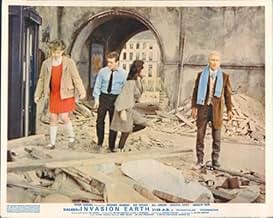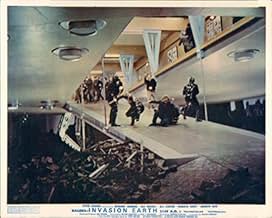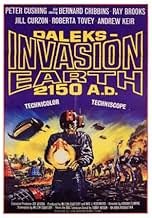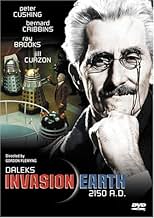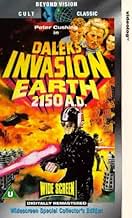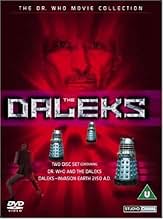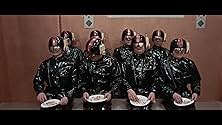Les Daleks envahissent la Terre
Titre original : Daleks' Invasion Earth 2150 A.D.
- 1966
- Tous publics
- 1h 24min
NOTE IMDb
5,9/10
4,9 k
MA NOTE
Le Dr Who et ses compagnons arrivent sur Terre en l'an 2150 après JC, pour découvrir que la planète a été envahie et sa population réduite en esclavage par les redoutables Daleks.Le Dr Who et ses compagnons arrivent sur Terre en l'an 2150 après JC, pour découvrir que la planète a été envahie et sa population réduite en esclavage par les redoutables Daleks.Le Dr Who et ses compagnons arrivent sur Terre en l'an 2150 après JC, pour découvrir que la planète a été envahie et sa population réduite en esclavage par les redoutables Daleks.
- Réalisation
- Scénario
- Casting principal
Avis à la une
Daleks-Invasion Earth: 2150 A.D. is directed by Gordon Flemyng and Milton Subotsky co-adapts the screenplay with Terry Nation and David Whitaker. It stars Peter Cushing, Bernard Cribbins, Ray Brooks, Andrew Keir, Jill Curzon and Roberta Tovey. A Technicolor/Techniscope production, with music by Barry Gray and Bill McGuffie and cinematography by John Wilcox.
A sequel to Dr. Who and the Daleks (1965), plot finds Cushing once again playing the Doctor, who after getting transported to 2150 A.D. finds London ravaged by the Daleks. The Daleks are turning humans into slave Robomen, but an underground human resistance offers hope. Can the Doctor and his companions aid the resistance and save Earth from Dalek damnation? Even though Dr. Who and the Daleks irked the Dr. Who fan base, understandably so since Amicus' version of the good Doctor is some way from the TV series version, it was enough of a success to warrant this sequel. You pretty much get a retread of the first film with the characterisations, Cushing's Doctor is a lovable old eccentric prof, two of his lady female relations are along for the ride (Tovey returning as the same character) and Cribbins has replaced Roy Castle as the light relief companion accidentally thrust into a chaotic world. The Daleks remain a unique and devilish foe, their voices unnerving and their colours vibrant in Technicolor.
Plot follows a familiar trajectory, much running, puffing, capture and escape histrionics, the good versus evil core booming throughout. The sets remain cheap, the effects basic but quaint, and the acting just about passes the test because everyone seems to be enjoying themselves and therefore performing it to the required standard. The music score is truly out of sync with the picture, at times it sounds like it belongs in a Carry On movie, at others an episode of The Avengers; in fact John Steed would have been a good addition to the plotting! But there is some darkness in the story, making it more potent than its prequel.
This wasn't as successful as the studio hoped, so a third film was shelved. If you aren't a hardcore Dr. Who fan and you can accept it on its own daft and fun terms? Then Daleks-Invasion Earth: 2150 A.D. is an enjoyable enough time filler. 6/10
A sequel to Dr. Who and the Daleks (1965), plot finds Cushing once again playing the Doctor, who after getting transported to 2150 A.D. finds London ravaged by the Daleks. The Daleks are turning humans into slave Robomen, but an underground human resistance offers hope. Can the Doctor and his companions aid the resistance and save Earth from Dalek damnation? Even though Dr. Who and the Daleks irked the Dr. Who fan base, understandably so since Amicus' version of the good Doctor is some way from the TV series version, it was enough of a success to warrant this sequel. You pretty much get a retread of the first film with the characterisations, Cushing's Doctor is a lovable old eccentric prof, two of his lady female relations are along for the ride (Tovey returning as the same character) and Cribbins has replaced Roy Castle as the light relief companion accidentally thrust into a chaotic world. The Daleks remain a unique and devilish foe, their voices unnerving and their colours vibrant in Technicolor.
Plot follows a familiar trajectory, much running, puffing, capture and escape histrionics, the good versus evil core booming throughout. The sets remain cheap, the effects basic but quaint, and the acting just about passes the test because everyone seems to be enjoying themselves and therefore performing it to the required standard. The music score is truly out of sync with the picture, at times it sounds like it belongs in a Carry On movie, at others an episode of The Avengers; in fact John Steed would have been a good addition to the plotting! But there is some darkness in the story, making it more potent than its prequel.
This wasn't as successful as the studio hoped, so a third film was shelved. If you aren't a hardcore Dr. Who fan and you can accept it on its own daft and fun terms? Then Daleks-Invasion Earth: 2150 A.D. is an enjoyable enough time filler. 6/10
If I'd seen this film for the first time now, having seen most of the TV series that inspired it, I'm not sure I'd be fantastically keen on it. But I'd like to think that I'd still enjoy it for it's superficial scariness and complete indifference towards any aspect of a plot that might get in the way of the oh-so-colourful set-pieces.
I remember first seeing this film one Saturday morning, after all of the other childrens' programmes had finished and in retrospect, that's probably when it works best - the music's loud and harsh enough to wake you up, but the story's not too taxing if you're not completely with it yet.
Fantastic stuff, if you're prepared to leave your brain at home for 90 minutes.
I remember first seeing this film one Saturday morning, after all of the other childrens' programmes had finished and in retrospect, that's probably when it works best - the music's loud and harsh enough to wake you up, but the story's not too taxing if you're not completely with it yet.
Fantastic stuff, if you're prepared to leave your brain at home for 90 minutes.
When I first saw this on TV as a kid, I was really taken with the fanciful far-out concepts of a conquered Earth. For a 12 year-old boy into sci-fi, this was and is the ultimate escapist fare. I had no knowledge of the British TV series at the time so my intro to Dr.Who was Peter Cushing (playing older than he is), the movie version of the old-time traditional Doctor. I probably saw this film before the previous one "Dr. Who and the Daleks" as I was puzzled by the Doctor's recognition of his old foes, the unforgettable Daleks. Yes, who can forget those frog-like voices, warped by metallics, usually screaming for the death of humans. The British cast is really keen, especially Cribbins as an out-of-place copper and Andrew Keir as a hobbled resistance fighter. They bring a curious reality to the fantastic setting.
The picture has a decidedly British flavor and, of course, is filmed in the British countryside. Though I didn't reason this out at the time when I was a kid, it had an obviously different taste to it; I was mostly familiar with U.S. low budget sci-fi pics of the '50s and '60s at the time. The scope of the picture seemed really huge back then: London in a destroyed state, humanity decimated. There was that really cool flying saucer, looking fully functional and detailed. And there were the creepy Robo-men, in their slick black bodysuits and far-out helmets, like some futuristic Nazis or space zombies. All of this stuff really just took me over and I couldn't wait for the next time the local TV channels would run it again (not very often, as it happened). Some years later, I realized the title, 2150 AD, sounded cool, but the invasion by the Daleks must have occurred only a few years before the events of this movie, and the dilapidated buildings all looked like they'd been wrecked in the sixties. Ah, no matter. Many years later, I got the DVD and the thrill, tho muted by the long passage of experience and adulthood, is still there. They really knew how to make 'em back then.
The picture has a decidedly British flavor and, of course, is filmed in the British countryside. Though I didn't reason this out at the time when I was a kid, it had an obviously different taste to it; I was mostly familiar with U.S. low budget sci-fi pics of the '50s and '60s at the time. The scope of the picture seemed really huge back then: London in a destroyed state, humanity decimated. There was that really cool flying saucer, looking fully functional and detailed. And there were the creepy Robo-men, in their slick black bodysuits and far-out helmets, like some futuristic Nazis or space zombies. All of this stuff really just took me over and I couldn't wait for the next time the local TV channels would run it again (not very often, as it happened). Some years later, I realized the title, 2150 AD, sounded cool, but the invasion by the Daleks must have occurred only a few years before the events of this movie, and the dilapidated buildings all looked like they'd been wrecked in the sixties. Ah, no matter. Many years later, I got the DVD and the thrill, tho muted by the long passage of experience and adulthood, is still there. They really knew how to make 'em back then.
Daleks-Invasion-Earth:2150 AD, is an enormous improval on the preceeding film. It is more exciting and enjoyable and there is an impending sense of fear throughout the movie wich was evident in the Television series around this time. Peter Cushing gets to grips with his role as The Doctor in this movie. Bernard Cribbins comes on board and is fantastic. Ray Brooks and Jill Curzon enhance the swinging sixties fell apparent in the previous film, and the action never gives up. The multi coloured Daleks are a more frightening sight in a future decaying London thatn on there own planet, and the set designs and designs of the vicious Robomen are again superb. This is a juvenile movie, but enjoyable at that. For a new Doctor Who movie, someone like Tim Burton or Steven Spielberg should remake this, and they would have an absolute goldmine on their hands.
I am a fan of the Doctor Who TV show, both in its original incarnation and in modern dress. I've also seen the two earlier movies and thought them odd and sad. I was therefore shocked and pleased to find this movie version of "The Dalek Invasion of the Earth" serial to be excellent. The pacing is better, the color photography by John Wilcox has its moments of beauty -- even the Technicolor Daleks have a peculiar beauty.
Working with only minor variations from the television serial, this demonstrates something I have long maintained: the writing on the TV DOCTOR WHO was often first rate. It was the cripplingly tiny budgets that often made it seem ridiculous, with its impossible shooting schedules, cardboard sets and monsters that frequently seemed to be a man lurking under a cast-off shag rug.
The memories of children often play them false in later years. People report on seeing a particular favorite DOCTOR WHO serial from childhood and being shocked at how much better it is in memory than looking at it as adults. Children assume the lovely details that the adult mind demands. How very pleasant for this adult to see them filled in here!
Working with only minor variations from the television serial, this demonstrates something I have long maintained: the writing on the TV DOCTOR WHO was often first rate. It was the cripplingly tiny budgets that often made it seem ridiculous, with its impossible shooting schedules, cardboard sets and monsters that frequently seemed to be a man lurking under a cast-off shag rug.
The memories of children often play them false in later years. People report on seeing a particular favorite DOCTOR WHO serial from childhood and being shocked at how much better it is in memory than looking at it as adults. Children assume the lovely details that the adult mind demands. How very pleasant for this adult to see them filled in here!
Le saviez-vous
- AnecdotesPeter Cushing only committed to the project if Roberta Tovey returned as his grand-daughter Susan alongside him, having built up a rapport on previous film Dr Who contre les Daleks (1965).
- GaffesThe Dalek in the Thames does not flash its lights when addressing the Robomen, as the casing did not contain an operator.
- Versions alternativesSome versions of the film open with the credits sequence before switching to Tom's night-time street patrol. The original version opens with the raid, then the titles, then Tom's awakening in TARDIS.
- ConnexionsFeatured in Movie 4: Invasion Earth, 2150 A.D. (1972)
Meilleurs choix
Connectez-vous pour évaluer et suivre la liste de favoris afin de recevoir des recommandations personnalisées
- How long is Daleks' Invasion Earth 2150 A.D.?Alimenté par Alexa
Détails
- Date de sortie
- Pays d’origine
- Langue
- Aussi connu sous le nom de
- Dr. Who: Daleks Invasion Earth 2150 A.D.
- Lieux de tournage
- Slipway, Battersea Church Road, Battersea, London, Greater London, Angleterre, Royaume-Uni(Dalek rising out of the river)
- Sociétés de production
- Voir plus de crédits d'entreprise sur IMDbPro
Box-office
- Budget
- 286 000 £GB (estimé)
- Montant brut mondial
- 115 $US
Contribuer à cette page
Suggérer une modification ou ajouter du contenu manquant



